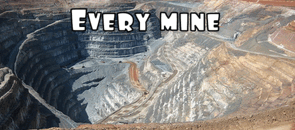This guide serves as a quick reference to evaluate whether
reported mineable reserves of granite (building stone) in a mining plan align
with theoretical values derived for different areas with varying
length-to-breadth ratios. The considerations for theoretical values are based
on the following assumptions:
- The land exhibits a gentle slope or is flat.
- The thickness of overburden is minimal or nonexistent.
- The land has a regular shape (square or rectangular).
- The depth of mining can extend down to a quarry floor with a minimum width of 10 meters.
Mineable reserves have been calculated using both the
bench-wise cross-sectional method and the conventional reserve calculation
method. Different Receognised Qualified Persons (RQPs) may use either of these
methods, leading to variations in reported values.
Theoretical values provided in the table represent the
maximum mineable reserves achievable for a specific area. Actual reserves may
be less if the land is irregular in shape or has a significant slope, as
increased slope generally correlates with reduced reserves. This table offers a
convenient way to quickly assess whether RQP-reported values fall within the
theoretical maximums. If reported values surpass the theoretical maximum, it is
advisable to scrutinize the computation for potential errors.
Download Ready Reckoner Table (PDF)


















0 Comments